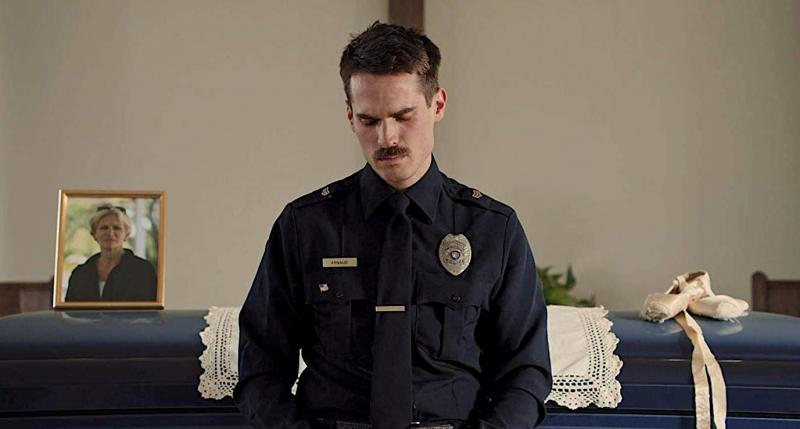Thunder Road review - potent and poignant debut feature | reviews, news & interviews
Thunder Road review - potent and poignant debut feature
Thunder Road review - potent and poignant debut feature
A triumph for Jim Cummings as writer, director and lead actor

This is a painful and poignant study of character-disintegration, and a triumph for its writer, director and star Jim Cummings. He plays small-town police officer Jim Arnaud, a man trying to do his best while a rising sea of troubles threatens to drown him.
Thunder Road is based on Cummings’s original 12-minute film, which won him the Short Film Grand Jury prize at the 2016 Sundance Festival. This provides the material for the opening scene, a daringly extended single shot in which Jim delivers the eulogy at his mother’s funeral. Despite looking pressed and formal in his police uniform, inside Jim is a raw tangle of grief, guilt, anger and confusion. He works his way through all of them in a performance which keeps threatening to collapse as he switches manically between misery and mania, but somehow keeps staggering on. It peaks with his attempt to sing his mother’s favourite song, Bruce Springsteen’s “Thunder Road”, but the music player won’t work and Jim ends up delivering a free-form dance interpretation (his mother had been a dancer, but not like this). The assembled mourners exchange eye-rolling looks which speak volumes about Jim’s mental condition.
As the narrative follows the routine of Jim’s disordered life, it picks out clues about how he has veered off the rails. Jim has a brother and sister who he rarely sees, and his only real friend is his police partner Nate Lewis (Nican Robinson), who’s also his sole connection to the better, brighter days he enjoyed before his marriage went bad. He’s divorced from his wife Rosalind (Jocelyn deBoer) and they share custody of their smart but disturbed daughter Crystal (Kendal Farr, pictured below).
 Jim is desperate to be a loving parent, but he’s either neurotically over-protective of Crystal or crushed with shame at his own fatherly inadequacies. A visit to her teacher, who explains as tactfully as possible that Crystal is a disruptive student with reading difficulties, sends Jim into a fresh spasm of self-loathing because he thinks he’s passed his own dyslexia on to his daughter. His burst of rage gets the teacher ducking for cover.
Jim is desperate to be a loving parent, but he’s either neurotically over-protective of Crystal or crushed with shame at his own fatherly inadequacies. A visit to her teacher, who explains as tactfully as possible that Crystal is a disruptive student with reading difficulties, sends Jim into a fresh spasm of self-loathing because he thinks he’s passed his own dyslexia on to his daughter. His burst of rage gets the teacher ducking for cover.
Jim’s a man on the edge, or even over it, but we can see that beneath his chaotic exterior there’s a good guy struggling to get out. He has been decorated for his police work, and the way he rescues a teenage girl from the attentions of a couple of “slickers” in the back seat of a car suggests that he has a strict moral code which he carries into his professional life.
Jim’s progress is a painful illustration of the way that once the odds start stacking against you, everything that can go wrong duly does. A court hearing about child custody turns disastrous when Jim talks back to the judge. An argument with Nate blows up out of control, and ends with Jim becoming an ex-policeman. Yet, in the end, Cummings finds a glimmer of hope, taking his cue from the Boss’s titular song: “It’s a town full of losers, we’re pulling out of here to win.”
rating
Explore topics
Share this article
The future of Arts Journalism
You can stop theartsdesk.com closing!
We urgently need financing to survive. Our fundraising drive has thus far raised £49,000 but we need to reach £100,000 or we will be forced to close. Please contribute here: https://gofund.me/c3f6033d
And if you can forward this information to anyone who might assist, we’d be grateful.

Subscribe to theartsdesk.com
Thank you for continuing to read our work on theartsdesk.com. For unlimited access to every article in its entirety, including our archive of more than 15,000 pieces, we're asking for £5 per month or £40 per year. We feel it's a very good deal, and hope you do too.
To take a subscription now simply click here.
And if you're looking for that extra gift for a friend or family member, why not treat them to a theartsdesk.com gift subscription?
more Film
 Can I get a Witness? review - time to die before you get old
Ann Marie Fleming directs Sandra Oh in dystopian fantasy that fails to ignite
Can I get a Witness? review - time to die before you get old
Ann Marie Fleming directs Sandra Oh in dystopian fantasy that fails to ignite
 Happyend review - the kids are never alright
In this futuristic blackboard jungle everything is a bit too manicured
Happyend review - the kids are never alright
In this futuristic blackboard jungle everything is a bit too manicured
 Robert Redford (1936-2025)
The star was more admired within the screen trade than by the critics
Robert Redford (1936-2025)
The star was more admired within the screen trade than by the critics
 Blu-ray: The Sons of Great Bear
DEFA's first 'Red Western': a revisionist take on colonial expansion
Blu-ray: The Sons of Great Bear
DEFA's first 'Red Western': a revisionist take on colonial expansion
 Spinal Tap II: The End Continues review - comedy rock band fails to revive past glories
Belated satirical sequel runs out of gas
Spinal Tap II: The End Continues review - comedy rock band fails to revive past glories
Belated satirical sequel runs out of gas
 Downton Abbey: The Grand Finale review - an attemptedly elegiac final chapter haunted by its past
Noel Coward is a welcome visitor to the insular world of the hit series
Downton Abbey: The Grand Finale review - an attemptedly elegiac final chapter haunted by its past
Noel Coward is a welcome visitor to the insular world of the hit series
 Islands review - sunshine noir serves an ace
Sam Riley is the holiday resort tennis pro in over his head
Islands review - sunshine noir serves an ace
Sam Riley is the holiday resort tennis pro in over his head
 theartsdesk Q&A: actor Sam Riley on playing a washed-up loner in the thriller 'Islands'
The actor discusses his love of self-destructive characters and the problem with fame
theartsdesk Q&A: actor Sam Riley on playing a washed-up loner in the thriller 'Islands'
The actor discusses his love of self-destructive characters and the problem with fame
 Honey Don’t! review - film noir in the bright sun
A Coen brother with a blood-simple gumshoe caper
Honey Don’t! review - film noir in the bright sun
A Coen brother with a blood-simple gumshoe caper
 The Courageous review - Ophélia Kolb excels as a single mother on the edge
Jasmin Gordon's directorial debut features strong performances but leaves too much unexplained
The Courageous review - Ophélia Kolb excels as a single mother on the edge
Jasmin Gordon's directorial debut features strong performances but leaves too much unexplained
 Blu-ray: The Graduate
Post #MeToo, can Mike Nichols' second feature still lay claim to Classic Film status?
Blu-ray: The Graduate
Post #MeToo, can Mike Nichols' second feature still lay claim to Classic Film status?

Add comment